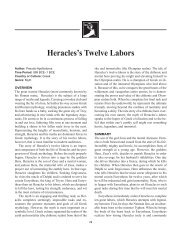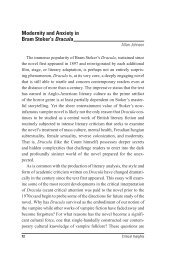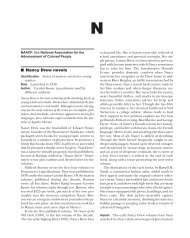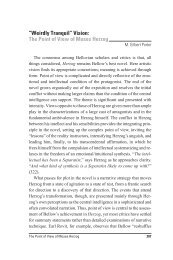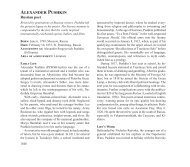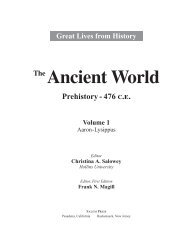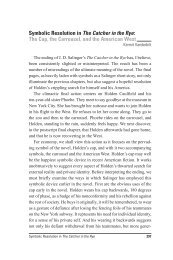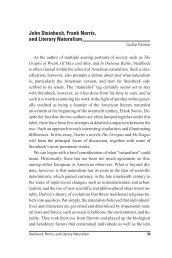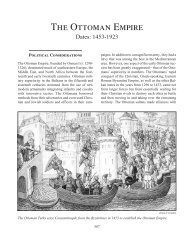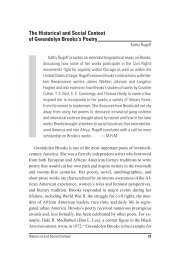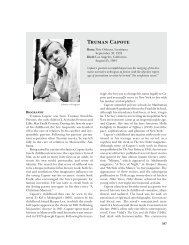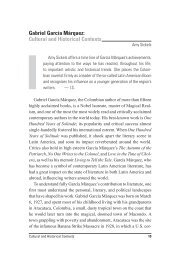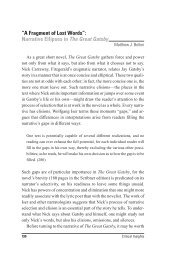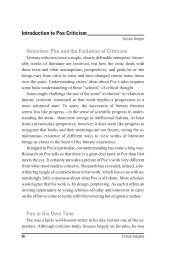Create successful ePaper yourself
Turn your PDF publications into a flip-book with our unique Google optimized e-Paper software.
Critical Survey of Poetry <strong>Nash</strong>, <strong>Ogden</strong><br />
an apt characterization of the writing. The speaker is<br />
<strong>Nash</strong> himself, an office worker on Madison Avenue<br />
whose mind wanders during a bout of spring fever. There<br />
is no real point to the wandering, which takes him from<br />
Missouri to Massachusetts and from his chiropodist to<br />
John the Baptist, who becomes the “Bobodist.” There is<br />
only the vague wish for freedom, symbolized by the<br />
“wings of a bird.” By the illogic of rhyme, the “bird” can<br />
take the speaker to Second Avenue and even to “Third.”<br />
“More About People”<br />
<strong>Nash</strong> began writing for publication when the United<br />
States was entering the Great Depression. Although he<br />
wrote for a magazine that targeted New York’s affluent<br />
social set, he became increasingly aware of the gap between<br />
the rich and the poor. A contribution from 1930,<br />
“More About People,” shows his awareness that “work<br />
is wonderful medicine” for anyone in danger of starvation.<br />
Seeking a rhyme for “medicine,” he runs through a<br />
list of employers, “Firestone and Ford and Edison,” using<br />
the well-known names to evoke successful people.<br />
Nevertheless, he sides with the employed rather than<br />
with the employers. The poem continues through eight<br />
couplets, ending with “a nasty quirk”: “if you don’t want<br />
to work you have to work to earn enough money so that<br />
you won’t have to work.”<br />
“A Necessary Dirge”<br />
<strong>Nash</strong> loved to play the curmudgeon and could rail<br />
about everything from billboards to parsnips, but he was<br />
always able to put life in perspective. “A Necessary<br />
Dirge” (1935) is a reflection on the perversity of “man’s<br />
fate” in ten rhyming couplets. For example, “How easy<br />
for those who do not bulge/ Not to indulge.” <strong>Nash</strong> combines<br />
the universal and the particular, the Lexington Avenue<br />
express subway train and the hero’s quest. He<br />
would like to raise the big question of theodicy: He<br />
would like to ask God why there is suffering in the<br />
world. Yet he accepts his fate, “to be irked,” and advises<br />
readers to take the “irking with insouciant urbanity.” Humorous<br />
poetry can also be wise, as this poem shows.<br />
“Ask Daddy, He Won’t Know”<br />
As his family grew, <strong>Nash</strong>’s poems extended to all aspects<br />
of domestic life. Looking forward to the rituals of<br />
homework in a 1942 poem, “Ask Daddy, He Won’t<br />
Know,” the speaker dreads the impending discovery that<br />
yesterday’s genius—the boy whose “scholarship was fa-<br />
mous”—will become tomorrow’s “ignoramus,” unable<br />
to answer questions about geometry and geography. The<br />
speaker is proud of his children but admits that he is<br />
“overwhelmed by their erudite banter.” Of course, the<br />
poem is ironic; <strong>Nash</strong> commands all sorts of random information,<br />
even if it tends to stay “just back of the tip of<br />
my tongue.” The real ignoramuses, by implication, are<br />
the young who assume that he knows nothing, and not<br />
just <strong>Nash</strong>’s young. “Try to explain that to your young,”<br />
he says to the reader.<br />
Versus<br />
<strong>Nash</strong>’s first volume of poetry after World War II was<br />
full of paradoxes. Its very title suggests that the poet is<br />
adversarial in nature, going against the prosaic order of<br />
things. His verses on subjects from bridge to birthday<br />
cake are also statements “versus” unthinking acceptance<br />
of things as they are. He is well aware of his poetic tradition;<br />
he knows that William Wordsworth said, “The<br />
Child is father of the Man” (in “My Heart Leaps Up,”<br />
1802); however, he knows enough about children that he<br />
would like to add, “But not for quite a while.” His poem<br />
on the subject, titled “Lines to Be Embroidered on a<br />
Bib,” employs the verse form known as the clerihew; it<br />
takes the names of famous writers and thinkers and<br />
makes rhymes with them with the sort of witty precision<br />
that W. H. Auden would master.<br />
<strong>Nash</strong> jokes about the squabbles between a big dog<br />
and a little dog in a poem whose title, “Two Dogs Have<br />
I,” alludes to Sonnet 144 of William Shakespeare. The<br />
dust-jacket blurb notes that British readers had found the<br />
philosophical side of <strong>Nash</strong> that Americans often miss,<br />
and it quotes The Times of London on the “Democritean<br />
streak which entitles him to the respect due to a philosopher,<br />
albeit a laughing one.” Indeed, much as the ancient<br />
Greek philosopher Democritus opined on the full and<br />
the void, <strong>Nash</strong> turns the old adage “Nature abhors a vacuum”<br />
into a personal reflection on the housing crisis in<br />
“Nature Abhors a Vacancy.” No matter if one misses the<br />
occasional allusion: There are gags for all.<br />
There’s Always Another Windmill<br />
Amid the postwar optimism, <strong>Nash</strong> found much to<br />
grumble about but few publishers who wanted his<br />
grumblings. He turned to lighter subjects, like animals,<br />
and to familiar verse forms like the limerick. When he<br />
took on unpopular causes, he adapted a quixotic tone,<br />
2737



